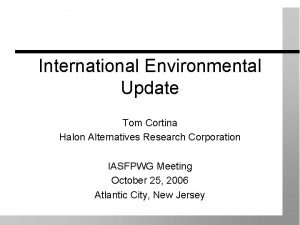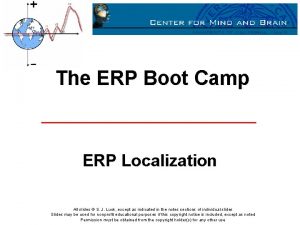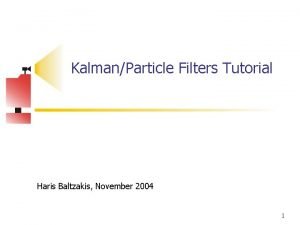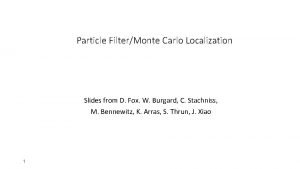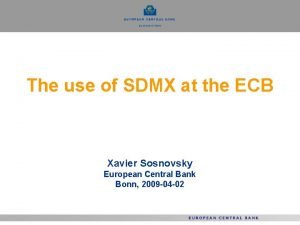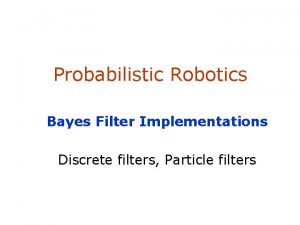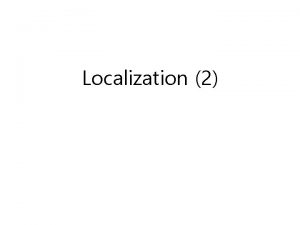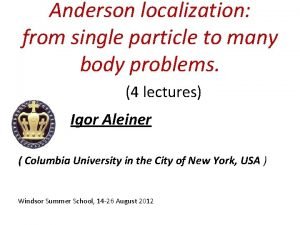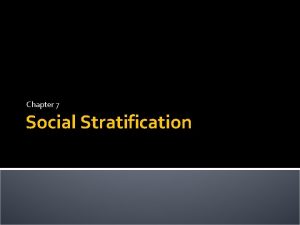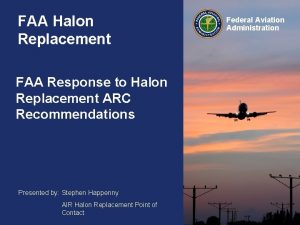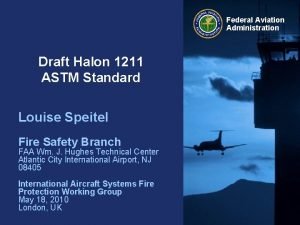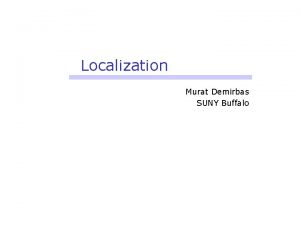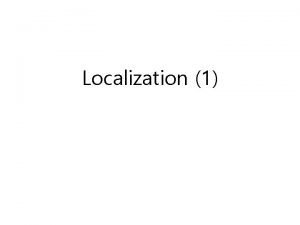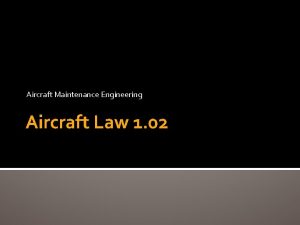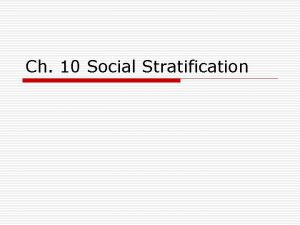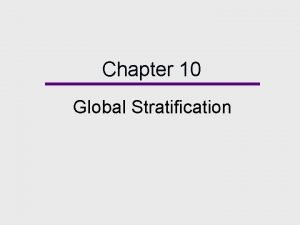Halon 1211 Stratification Localization in Aircraft Louise Speitel









































- Slides: 41

Halon 1211 Stratification/ Localization in Aircraft Louise Speitel Fire Safety Branch FAA Wm. J. Hughes Technical Center Atlantic City International Airport, NJ 08405 International Aircraft Systems Fire Protection Working Group November 16 -17, 2011 Atlantic City, New Jersey Federal Aviation Administration

Background Per AC 20 -42 D - Halon 1211, Halotron 1, and BTP are unsafe for use in Boeing airplane flight decks and other small volumes. AC 20 -42 D, Chapter 4. 4 b(3), (4) states that concentrations may be adjusted to account for agent localization/ stratification…a report will be published at the FAA Technical Center with method to adjust safe-use concentrations. Halon 1211 Stratification in Aircraft Federal Aviation Administration 2 2

Comparison of Minimum Safe Volumes for 2. 5 lb Halon 1211 Stratification in Aircraft Federal Aviation Administration 3 3

Minimum Safe Compartment Volume for One Extinguisher in Unventilated Compartments (from AC 20 -42 D) Agent Weighta (lbs) Minimum Safe Volume for One 5 B: C Extinguisher (ft 3) Sea Level (info only) Pressurized Aircraft 8, 000 ft CPA Non-Pressurized Aircraft 12, 500 ft 14, 000 ft 18, 000 ft 25, 000 ft HCFC Blend Bb 5. 5 1102 1482 1768 1877 2209 2973 HFC-227 eab 5. 75 104 141 167 177 209 280 HFC-236 fab 4. 75 79. 8 107 128 136 159 214 Halon 1211 c 2. 5 1116 1502 1790 1908 2232 3016 Halon 1211 d, e 2. 5 558 751 895 954 1116 1508 Halon 1301 b 5. 0 192 258 308 327 385 517 a Agent weight for a 5 B: C extinguisher is extinguisher dependent. Nozzle design, pressurization differences and other factors can result in different agent weights for extinguishers using the same agent. The tabulated minimum safe volumes should be corrected for the actual agent weight if different from the agent weight in this figure. b Values based on the safe human concentration. See reference report appendix 3, paragraph 7. m. of this AC. c Values are based on the Halon 1211 NOAEL concentration of 0. 5% (v/. v) d Values are based on the Halon 1211 LOAEL concentration of 1. 0 % (v/v). e Safe human concentrations are not available for Halon 1211 using the same criteria as for other agents. However, the Halon 1211 LOAEL concentration of 1% (v/v) has been shown to be safe for humans. See report mentioned in note b above. Also, the safety factor is smaller than that set for other agents. Halon 1211 Stratification in Aircraft Federal Aviation Administration 4 4

Multiplication Factors (MF Ventilated) for Ventilated Compartments (from AC 20 -42 D) Agent Air Change Time, τ (minutes) 0. 5 1. 0 1. 5 2. 0 3. 0 HCFC Blend B 2. 80 2. 33 2. 14 2. 02 1. 89 4. 0 5. 0 6. 0 >6 a 1. 79 1. 70 1. 62 1 HFC-227 ea 1. 90 1. 53 1. 39 1. 32 1. 24 1. 19 1. 16 1. 14 1 HFC-236 fa 1. 98 1. 58 1. 42 1. 34 1. 25 1. 20 1. 17 1. 15 1 Halon 1211 b 1. 96 1. 57 1. 42 1. 34 1. 25 1. 21 1. 17 1. 15 1 Halon 1301 1. 96 1. 57 1. 42 1. 34 1 1. 25 1. 21 1. 17 1. 15 a No MF Ventilated is applied if air change time is greater than 6 minutes. b More conservative MF Ventilated than actual. Based on Halon 1301 MF Ventilated. Halon 1211 Stratification in Aircraft Federal Aviation Administration 5 5

Goal • Develop test- based multiplication factors to allow higher concentrations than AC 20 -42 D guidance provides : Ø Small aircraft Ø Flight decks Ø Large cabins • Tests evaluate stratification/ localization of Halon 1211 discharged from one extinguisher. • Determine multiplication factors based on equivalent safety for that test ventilation rate. Halon 1211 Stratification in Aircraft Federal Aviation Administration 6 6

Method • Small aircraft: Use concentration histories from existing reports. • Flight decks: B 737 Tests • Large cabins: B 737 Tests • Multiplication factors (MF) will be based on maximum computed human arterial blood concentrations, B: Compare maximum B for perfect mixing (ventilated) to test (ventilated) maximum B. • This MF will be a multiplier for the maximum agent W/V in AC 20 -42 D. Halon 1211 Stratification in Aircraft Federal Aviation Administration 7 7

B-737 Test Article Halon 1211 Stratification in Aircraft Federal Aviation Administration 8 8

B 737 Test Article Halon 1211 Stratification in Aircraft Federal Aviation Administration 9 9

B 737 Test Article • The passenger cabin is 630” long x 137” wide (52. 5 ft x 11. 4 ft) • Total Cabin Volume = Front Galley + Passenger Seating Area + Rear Galley = 315 ft 3 + 3489 ft 3 + 323 ft 3 = 4127 ft 3 • The cabin volume includes the front and rear galleys and the passenger seating area. • The seats, overhead storage and other enclosed areas were subtracted out. • The flight deck volume is 129 ft 3 • The firefighter volume is 5. 7 ft 3 Halon 1211 Stratification in Aircraft Federal Aviation Administration 10 10

Cabin Test Plan: • Discharge one 5 B: C Halon 1211 extinguisher in rear of passenger compartment. Aim at exit light leading to rear galley. • Sampling stations: 1 Sampling station per discharge test. Ø 6’ horizontally from the target (at firefighter’s position) Ø 18’ Horizontally from the target Ø 3 Heights: 60”, 41” and 22’ (Standing, seated and resting nose height). Extinguisher nozzle is held 6” forward of the sample tree • Predict maximum arterial concentrations (BMax) for each Halon 1211 discharge test. • Compare to the maximum arterial concentration that would be obtained if perfect mixing (same compartment, same ventilation). • Determine multiplication factors for each position Halon 1211 Stratification in Aircraft Federal Aviation Administration 11 11

Cabin Test using Luft NDIR Gas Analyzers Top View Ceiling Exit Light Sampling Stations 6’ 12’ Firefighter Front View Floor Level Sampling Stations 1 4 2 5 3 6 41” 60” 22” Halon 1211 Stratification in Aircraft Federal Aviation Administration 12 12

Cabin Test: Target Halon 1211 Stratification in Aircraft Federal Aviation Administration 13 13

Cabin Test Target 60” Probe 41” Probe 22” Probe Halon 1211 Stratification in Aircraft Federal Aviation Administration 14 14

Cabin Test Halon 1211 Stratification in Aircraft Federal Aviation Administration 15 15

Cabin Test Halon 1211 Stratification in Aircraft Federal Aviation Administration 16 16

Cabin Test Halon 1211 Stratification in Aircraft Federal Aviation Administration 17 17

B 737 Flight Deck Halon 1211 Stratification in Aircraft Federal Aviation Administration 18 18

Flight Deck: Plan: • Discharge one 5 B: C Halon 1211 extinguisher with side to side sweeping motion. • Firefighter seated in aft port seat behind pilot. Nozzle height= 36”, Ø Scenerio 1: Target: copilot’s window heater. Target: 33” to 36” height, width of target=17”. Target is 38” from nozzle. Ø Scenerio 2: Target: copilot’s instrument panel. 17” to 25” off floor, 10” width, Target distance from centerline: 9” to 19”. Target is 42” from nozzle. • Sample position: Pilots nose position Ø 3 Heights: q 57” Standing q 41” Seated q 22’ Resting nose height • Predict maximum arterial concentrations (BMax) for each Halon 1211 discharge test. Halon 1211 Stratification in Aircraft Federal Aviation Administration 19 19

Flight Deck Tests using NDIR Gas Analyzers Target 1: Window Heater (33” – 36”” height) Top View Target 2: Lower Panel Door Extinguisher Nozzle Sampling Station Instrument Panel Side View Target 1: 33 -36” height Target 2: 17 -25” height Sampling Probes 57” 3 41” 2 22” 1 36” height Extinguisher Nozzle Halon 1211 Stratification in Aircraft Floor Level Federal Aviation Administration 20 20

Flight Deck Targets Instrument Panel Halon 1211 Stratification in Aircraft Window Heater Federal Aviation Administration 21 21

Flight Deck Sampling Position : Above Pilot’s Seat 57” Probe 41” Probe 22” Probe Halon 1211 Stratification in Aircraft Federal Aviation Administration 22 22

Flight Deck Tests: Target: Copilot’s Window Heater Halon 1211 Stratification in Aircraft Federal Aviation Administration 23 23

Flight Deck Tests: Target: Copilot’s Window Heater Halon 1211 Stratification in Aircraft Federal Aviation Administration 24 24

Flight Deck Tests: Target: Copilot’s Instrument Panel Halon 1211 Stratification in Aircraft Federal Aviation Administration 25 25

Flight Deck Tests: Instrument Panel: Copilot’s Side Halon 1211 Stratification in Aircraft Federal Aviation Administration 26 26

Flight Deck: Ventilation Rate Measurement 60” Probe Fan 32” Probe 3” Probe Halon 1211 Stratification in Aircraft Federal Aviation Administration 27 27

Flight Deck: Ventilation Rate Measurement Halon 1211 Stratification in Aircraft Federal Aviation Administration 28 28

Flight Deck: Ventilation Rate Measurement Halon 1211 Stratification in Aircraft Federal Aviation Administration 29 29

Flight Deck: Ventilation Rate Measurement Halon 1211 Stratification in Aircraft Federal Aviation Administration 30 30

Flight Deck: Ventilation Rate Measurement Halon 1211 Stratification in Aircraft Federal Aviation Administration 31 31

Summary • Standing height : MF (Ventilation/Localization) will be very large Ø Flight Deck, 57”: Maximum Halon 1211 Concentrations are 7 to 15 fold lower than initial perfect mixing concentrations Ø Cabin, 60”: Maximum Halon 1211 concentrations are 10 to 20 fold lower than initial perfect mixing concentrations 6” from target. Agent barely detectable at 18’ from target • Seated Height, 41” Ø Flight Deck: Maximum Halon 1211 Concentrations are 1. 6 to 2. 4 fold lower than initial perfect mixing concentrations Ø Cabin: Maximum Halon 1211 concentrations are 1. 9 to 2. 1 fold higher than initial perfect mixing concentrations 6’ from the target. At 18’, the agent is barely detectable. § Resting Height, 22” Ø Flight Deck: Maximum Halon 1211 Concentrations are 1. 5 to 1. 7 fold lower than initial perfect mixing concentrations. ØCabin: Maximum Halon 1211 concentrations are 2. 6 to 2. 9 fold higher than initial perfect mixing concentrations 6’ from the target. At 18’ concentrations are 2. 0 to 2. 4 higher than initial perfect mixing concentrations. Halon 1211 Stratification in Aircraft Federal Aviation Administration 32 32

Additional Work • Run CO 2 discharge test for cabin to obtain cabin air change time. • Obtain good air change times for the flight deck. • Calculate the maximum arterial concentrations for test and perfect mixing conditions with ventilation • Calculate safety factors for each position in each test. Halon 1211 Stratification in Aircraft Federal Aviation Administration 33 33

Considerations for Guidance Material • Corrections need to be made for the maximum anticipated volume of the passengers and crew. • Note: Test data is based on an non-inhabited cabin and flight deck (firefighter volume is subtracted out). Halon 1211 Stratification in Aircraft Federal Aviation Administration 34 34

Conclusions • Localization is significant in the aft of the cabin for the cabin tests. • Stratification is significant for both the flight deck and cabin tests. Halon 1211 Stratification in Aircraft Federal Aviation Administration 35 35

Simplified Kinetic Model Simulates human arterial blood concentration histories from inhaled constant or dissipating halocarbon concentrations Halon 1211 Stratification in Aircraft Federal Aviation Administration 36 36

Comparison of Kinetic Models for Halon 1301: B(t)/Bmax Unventilated Compartment ( = ) Time, minutes Halon 1211 Stratification in Aircraft Federal Aviation Administration 37 37

Arterial Blood Concentration, B(t) General equation for changing Halocarbon Concentrations: Halon 1211 Stratification in Aircraft Federal Aviation Administration 38 38

Method • Calculate B(t) for each sampling probe • Multiplication factors (MF) will be based on maximum computed human arterial blood concentrations, B: • Compare perfect mixing maximum B (ventilated) to test (ventilated) maximum B. • This MF may be a multiplier for the maximum agent W/V in AC 20 -42 D. Halon 1211 Stratification in Aircraft Federal Aviation Administration 39 39

Kinetic Model Halon 1211 Stratification in Aircraft Federal Aviation Administration 40 40

B(t)/Bsafe 1 st Order Kinetic Modeling of Halon 1301 in Ventilated Compartments Time, minutes Ratio of the Arterial Blood Concentration of Halon 1301 to the Target Value Bsafe for Simulated Human Exposures to Asafe in a Ventilated Cabin at the Indicated Air Exchange Times Halon 1211 Stratification in Aircraft Federal Aviation Administration 41 41
 Xtase montreal
Xtase montreal Tom halon
Tom halon Halon za gašenje požara
Halon za gašenje požara Tom halon
Tom halon Jus1211
Jus1211 Jus 1211
Jus 1211 Jus 1211
Jus 1211 Localization quality assurance lqa services
Localization quality assurance lqa services Millers right angle technique
Millers right angle technique Dnn localization
Dnn localization Erp localization
Erp localization English module grade 10
English module grade 10 Markov localization
Markov localization Monte carlo localization for mobile robots
Monte carlo localization for mobile robots Action localization
Action localization Localized curriculum sample
Localized curriculum sample Query decomposition in dbms
Query decomposition in dbms Markov localization
Markov localization Globalization testing example
Globalization testing example Radiolabeling definition
Radiolabeling definition Voice localization using nearby wall reflections
Voice localization using nearby wall reflections Monte carlo localization python
Monte carlo localization python Icu localization
Icu localization Ecb sdmx
Ecb sdmx Localisation industry standards association
Localisation industry standards association Dynamics nav localization
Dynamics nav localization Bayes filter algorithm
Bayes filter algorithm Localization in mobile computing
Localization in mobile computing Crude touch
Crude touch Ib psychology
Ib psychology Localization and contextualization
Localization and contextualization Concept of probability
Concept of probability Localization courses
Localization courses Anderson localization lecture notes
Anderson localization lecture notes Mobile robot localization
Mobile robot localization Localization of behavior
Localization of behavior Inclusive localization
Inclusive localization Localization of function ib psychology
Localization of function ib psychology Localisation of distributed data
Localisation of distributed data Felix sasaki
Felix sasaki Markov localization
Markov localization Social stratification vs social inequality
Social stratification vs social inequality
